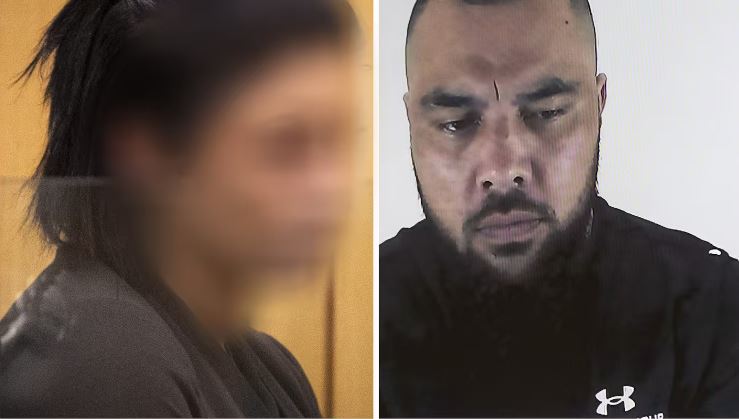- Arana Huriwaka was sentenced to seven-and-a-half years in prison for manslaughter.
- Huriwaka’s father, Thomas Ormsby, made a tearful plea in court, saying seeing his son in court was the worst moment of his life.
- Huriwaka’s accomplice received two years of intensive supervision for her role in the incident.


“This is the worst moment of my life,” the former inmate said as he looked at his son Arana Tamati Whakawa Huriwaka, who will now spend time behind bars too following an intra-gang dispute that claimed Barton’s life after he was stabbed in the neck.
The 34-year-old was sentenced today in the High Court at Nelson to seven-and-a-half years after pleading guilty in August to a reduced charge of manslaughter from an initial murder charge. The violence that led to Barton’s death happened while Huriwaka was serving home detention for earlier offending.
Both Huriwaka and Barton were patched members of the Aotearoa chapter of the Mongrel Mob gang and knew each other through wider family connections.
Crown prosecutor Jackson Webber said Barton’s death was not premeditated, but the attack that led to it was.
“Barton was just minding his business while at home,” he said.
Huriwaka’s accomplice, who can’t be named after she indicated an appeal against a decision to decline continued name suppression, was sentenced to two years of intensive supervision for the part she played as an accessory after the fact to manslaughter, plus further drugs-related charges.
On the night of November 10 last year, Barton answered a knock on the door of his partner’s home and was confronted by Huriwaka who was agitated and in a bad mood.

He then drove a white BMW that became a focus of the investigation towards Stoke, in an agitated and aggressive manner, heading towards where he knew Barton was.
‘I’m the f*****g captain’
He’d gone there intending to assault him over perceived failures to follow Mongrel Mob rules and report properly to senior Aotearoa chapter members in Christchurch.
As he approached the front door, two others remained in the car.
Barton’s partner was upstairs when she heard a man yelling at him, then saw Huriwaka as he held Barton and repeatedly punched him in an uppercut motion while yelling: “I’m the f*****g captain, not you.”
Barton’s partner tried calling for help and then told her son to jump out of the upstairs window and run to the neighbour.
Barton, who was older and not as strong as Huriwaka, produced a knife, but in the struggle over it Barton was stabbed in the neck.
The cut damaged his carotid artery and caused significant bleeding.
The victim’s partner heard Huriwaka tell Barton to hold something against his neck, but he failed to call emergency services and left the scene when his associates came to the door.
“He fled when he could have got him to hospital,” Webber said.
Huriwaka handed one of the associates the knife and told him to get rid of it, but the associate, who was afraid, placed it on a nearby fence.
The victim’s partner escaped through a window, but returned with her uncle, to help the victim.
Police and emergency services arrived and Barton was taken to Nelson Hospital where he died about an hour after the attack.
Huriwaka returned to Motueka, dropped off the associates, returned home, showered and changed his clothing.
He then went to the address of the woman later charged as the accomplice, who followed him in another vehicle as he parked the BMW in a secluded location at an associate’s rural property.
The pair returned to Motueka in the second vehicle.
The accomplice also hid and destroyed evidence linked to what happened.
The prosecutor said the accomplice had also maintained contact with Huriwaka afterwards and had discussed hiding evidence.
Huriwaka’s end prison sentence incorporated a resentencing on earlier driving charges for which he was given home detention, plus the breaches of that sentence, including that he had removed his electronic bracelet and driven when he was a disqualified driver.
Love you, ‘no matter what’
During sentencing, he listened to his father from an AVL booth in Christchurch Men’s Prison where he has been since his arrest.
He occasionally paced the small cubicle as family, friends and supporters of his and of the victim watched from the public gallery.
As his accomplice stood in the dock, her head bowed, Ormsby told his son via the video screen that he loved him, “no matter what”.
“I talk from my heart and from my soul and I want you to do the same,” he said while clutching a Bible.

Lucas said Huriwaka had had plenty of time to think through being locked up 22 hours a day, not only about his future but about his past and how he had got where he was.
Huriwaka, who was 2 years old when Ormsby was sent to prison, grew up in a life of violence and gravitated towards gang life as a teen.
They were factors considered by Justice Dale La Hood, who also said aggravating features included the use of a weapon, the element of home invasion and the gang context in which the “serious violence” occurred.
He said Huriwaka had an extensive criminal history which was indicative of his character and disregard for the law and for the safety of others.
From a starting point of 11 years in prison, which included uplifts for the “significant” breach of home detention plus the resentencing on the driving offences, Huriwaka was given discounts for his guilty plea, plus his personal circumstances to arrive at a sentence of seven-and-a-half years in prison, with minimum non-parole of three years.













